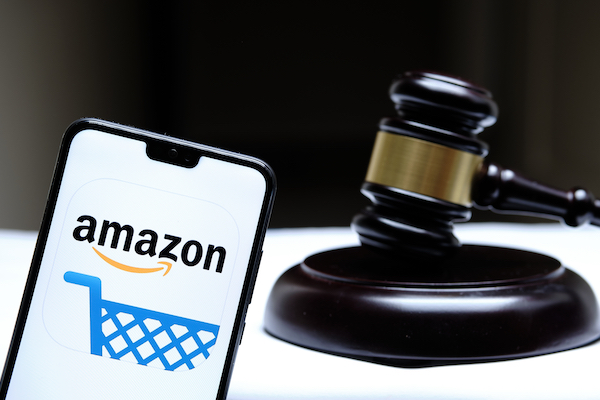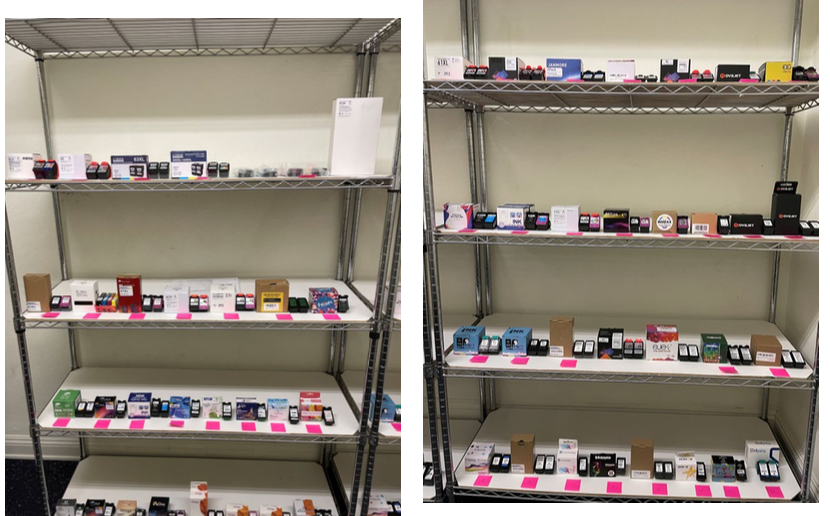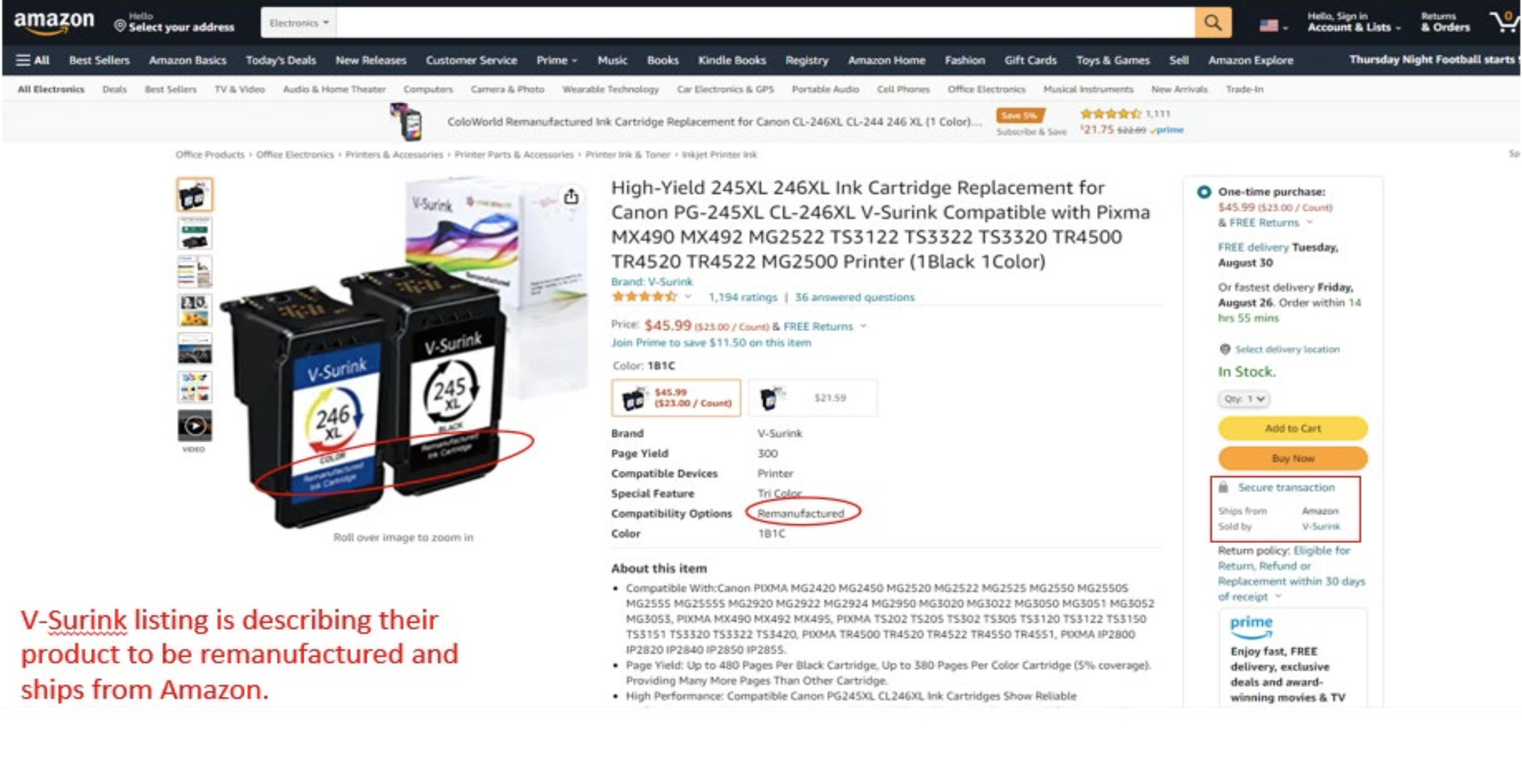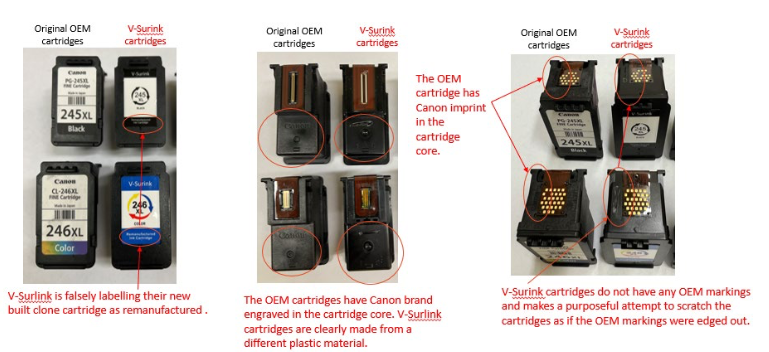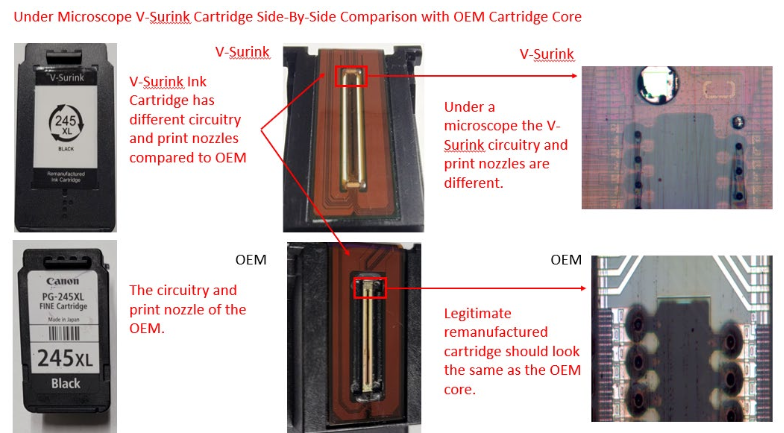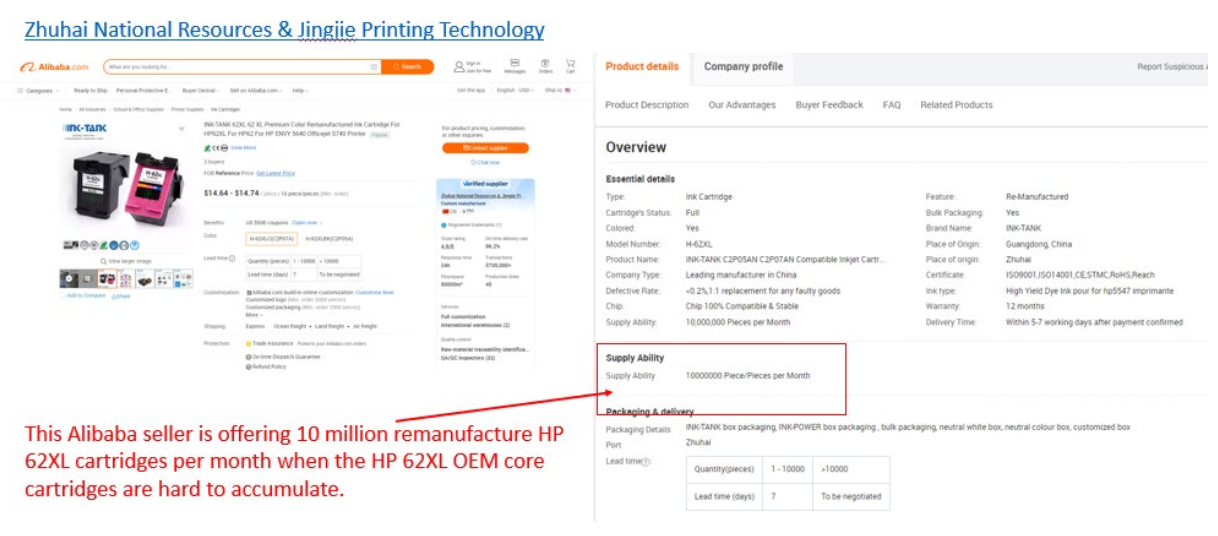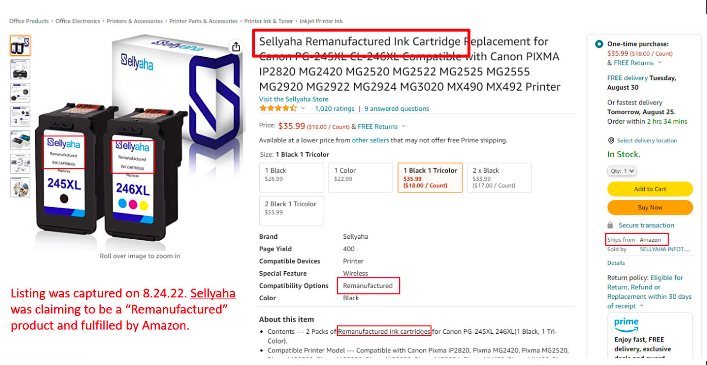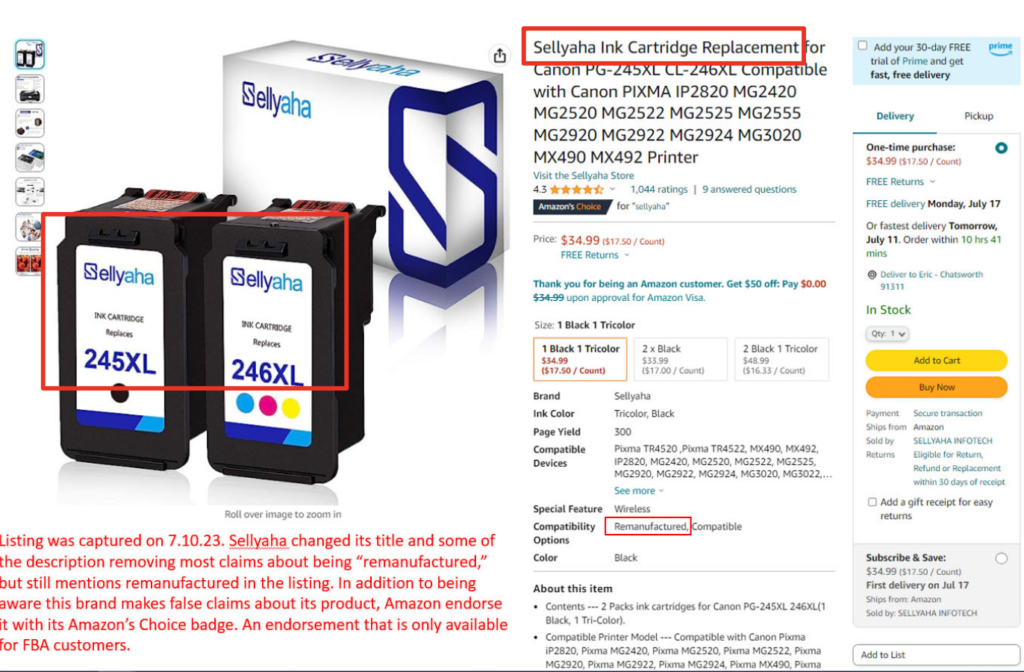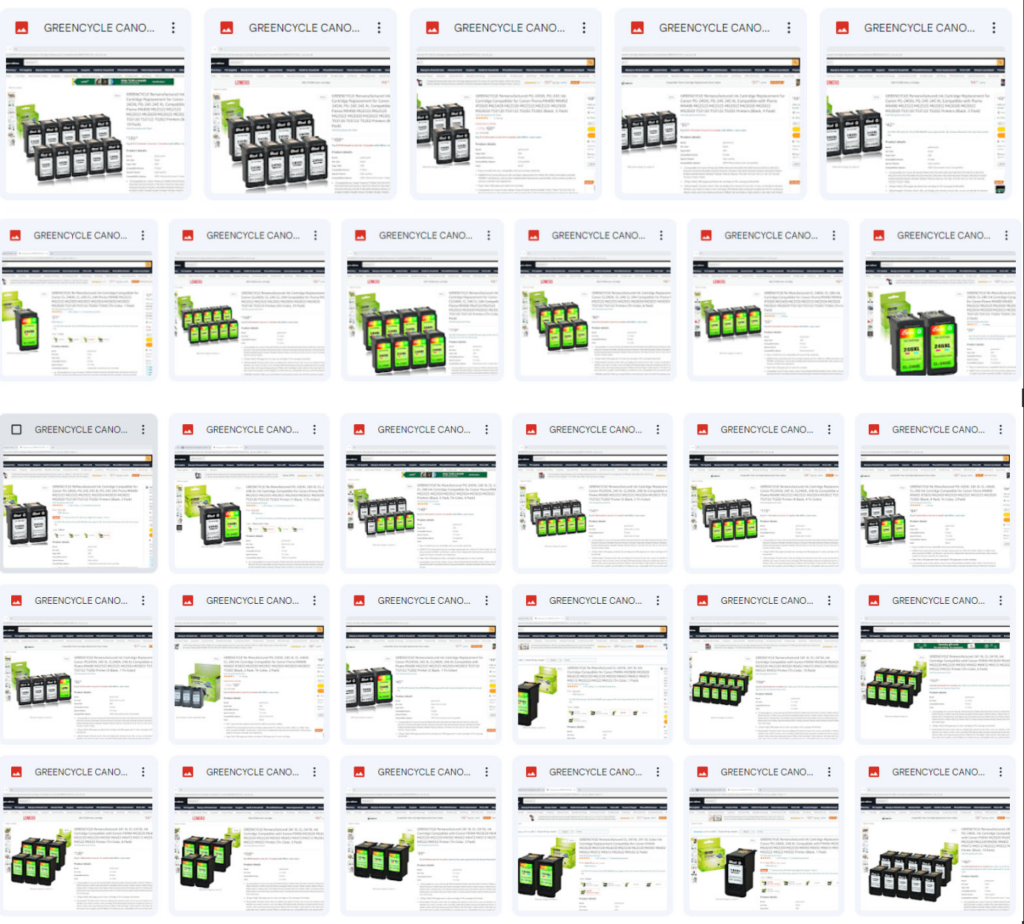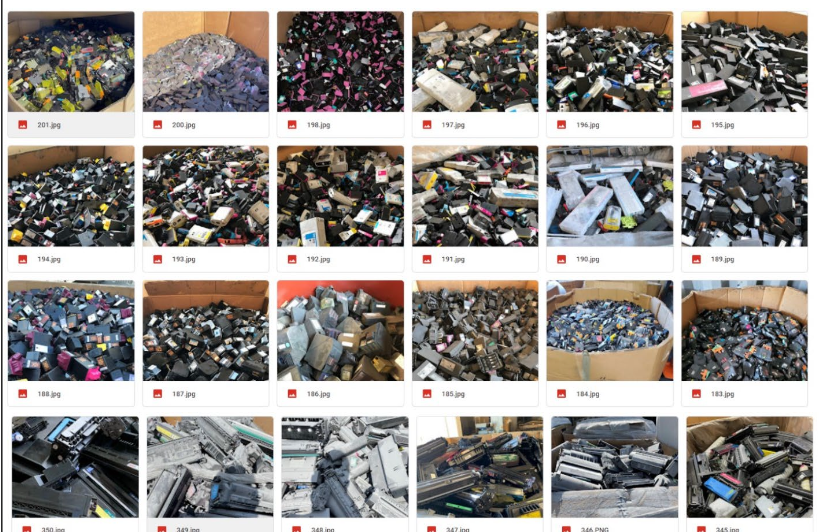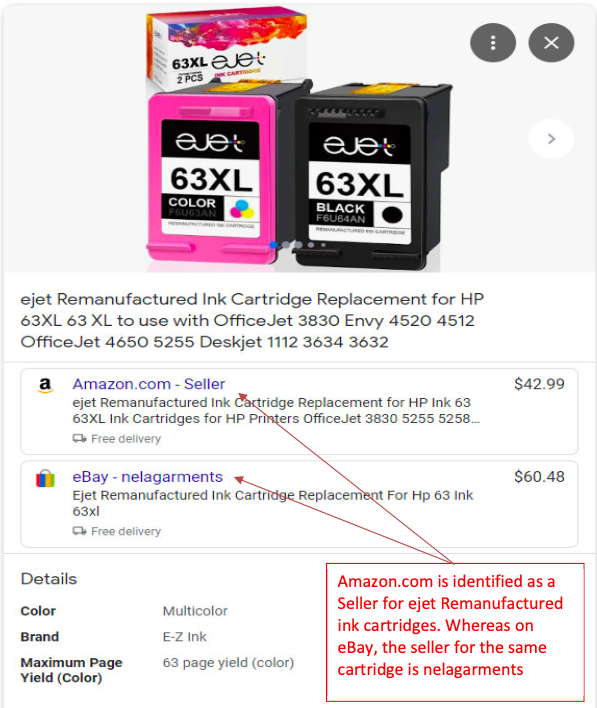On August 14, Planet Green Cartridges, a Chatsworth, CA-based remanufacturer of inkjet cartridges, filed a lawsuit against Amazon.com seeking damages of at least $500 million. The complaint centers on claims that new-build third-party inkjet cartridges are falsely sold on the Amazon marketplace as remanufactured or recycled, thereby deceiving consumers and making it almost impossible for legitimate remanufacturers to compete. The complaint, however, is actually about far more than that. At Actionable Intelligence, we believe this case has the potential to prove impactful for the third-party supplies industry—and not just because of the eye-popping claim for damages.
First of all, this is the only cartridge-focused lawsuit we are aware of to actually name Amazon as a defendant and not just certain Amazon sellers or the manufacturers supplying Amazon sellers. While we haven’t seen printer OEMs or supplies vendors sue Amazon before, plenty of other businesses across a wide range of other industries have. Amazon, however, has largely been shielded from liability over what its sellers sell and how they market those products under Section 230 of the Communications Decency Act. This lawsuit challenges that protection. The complaint alleges Amazon is willing to tolerate sellers that violate its own policies and the law and is both complicit in their activity and an active participant. Beyond that, the complaint tells the story of how Amazon’s marketplace and China’s third-party new-build cartridge makers essentially destroyed the U.S. cartridge remanufacturing industry. The “Amazon killed an industry” narrative is not new. Many industries have been decimated by Amazon’s rise. But Planet Green’s complaint puts a timely spin on this as the world is experiencing the devastating impact of climate change by emphasizing what Amazon has done isn’t only bad for the remanufacturing industry—it is bad for the planet.
“We have the right to compete in a marketplace that is fair,” asserts Sean Levi, CEO of Planet Green. “It is imperative for companies and online platforms to comply with the law and substantiate product claims; otherwise, it is unfair competition, and we will take all necessary measures to protect our business.”
The Basic Gist of the Complaint
Planet Green Cartridges, Inc., filed its complaint on August 14 in the U.S. District Court for the Central District of California. The defendants are Amazon.com, Inc.; Amazon.com Services LLC; and Amazon Advertising LLC (collectively “Amazon”). As noted above, the plaintiff is a Chatsworth, CA-based inkjet cartridge remanufacturer. In the complaint, the plaintiff states, “For the last 23 years, Planet Green has been an industry leader of wholesale, high-quality, United States remanufactured ink cartridge products. Planet Green remanufactures ink cartridges using only OEM cores that are collected from schools, businesses, and consumers throughout the United States. The remanufactured ink cartridges sold by Planet Green are authentic recycled products.”
While Amazon, the giant online marketplace, doesn’t require much introduction, it is worth noting that that Planet Green sued not only Amazon.com but also Amazon.com Services LLC, which operates Amazon Warehouse and Amazon fulfillment, and Amazon Advertising LLC, which “provides advertising services to third party sellers.”
The complaint is a hefty 67 pages, not including the exhibits. It centers on claims that consumers are being defrauded when new-build “clone” cartridges are falsely advertised and sold as remanufactured or recycled on Amazon. In the complaint, Planet Green says this is happening “on a mass scale.” Planet Green knows these cartridges are not remanufactured first hand not only because empties from many of these sellers end up in the cartridges it collects but also because it conducted research including test purchases and examination of the cartridges.
The complaint explains that Planet Green went to Amazon on June 23, 2022, with extensive evidence it compiled showing how 18 different brands were “falsely advertising, making unsubstantiated environmental claims, and selling clone cartridges falsely represented as remanufactured, in violation of Amazon’s policies, federal and state laws, and engaging in conduct antithetical to Amazon’s environmental mission and efforts.” (Planet Green’s presentation to Amazon is attached as Exhibit 1 to the complaint.) An example of such a listing from among the many shown in the complaint appears below. Planet Green asked Amazon to follow its own stated policies and remove or suspend these sellers. Amazon did not.
Planet Green continued to compile more evidence and presented a second presentation to Amazon on December 9, 2022 (Exhibit 2 of the complaint), in which it identified 82 brands that were falsely selling new-builds as remanufactured. The plaintiff states, “This presentation illustrates that Amazon has a category-wide issue with falsely labeled cartridges, promoted with unsubstantiated environmental claims, in violation of Amazon’s listing policies, which deceive consumers.” (Click here to see the numerous listings Planet Green captured from the 82 brands of cartridges.)
Planet Green says that via its presentations it put Amazon on notice about its wrongful conduct and gave it “an opportunity to do the right thing and stop the sale of falsely labelled clone printer cartridges that are deceiving consumers, harming the environment, and that have destroyed the once thriving printer cartridge remanufacturing industry.”
According to the plaintiff, Amazon acknowledged receiving the second presentation, but “Amazon took the positions that the Amazon Seller Code of Conduct prohibits sellers from making false statements about products and that Amazon is not responsible for seller statements and is immune from liability for publishing third-party content on its platform under Section 230 of the Communications Decency Act, 47 U.S.C. § 230.”
The complaint also references a Zoom meeting between the parties on May 26, 2023. Planet Green alleges that at that meeting, “Defendants told Plaintiff that they had asked brands that could not substantiate claims of being remanufactured or recyclable to change their product descriptions to continue to sell on the platform.” The plaintiff claims, however, “The deceptive practices have not changed, and Defendants continue to allow sellers that have deceived millions of consumers with its false advertising and recyclability claims to sell clone ink cartridges over Amazon.”
The plaintiff says it is thus filing this lawsuit “to stop Amazon’s direct and complicit behavior, which has caused significant damage to Plaintiff.” Planet Green asserts, “Defendants’ refusal to take meaningful steps to stop the sale of misrepresented clone cartridges has forced Plaintiff to resort to this litigation. Despite being the largest catalog marketer online, with vast resources, Amazon’s efforts and willingness to stop clone cartridge sales have been so incredibly ineffective, rendering it effectively nonexistent.”
Count 1 against the defendants is a Lanham Act claim, specifically violation of Section 43(a) of the Lanham Act, 15 U.S.C. section 1125(a). The plaintiff says, “Defendants’ conduct as described above constitutes the use of false statements, false descriptions and representations of fact,” thereby violating this law. Count 2 is common law unfair competition; Count 3 is violation of the unlawful and unfair prongs of California’s Unfair Competition Law (UCL), including provisions related to unlawful environmental marketing claims; and Count 4 is violation of California’s False Advertising Law (FAL).
In the complaint’s prayer for relief, Planet Green requests a preliminary and permanent injunction against the defendants that would enjoin them from “unlawful, unfair or fraudulent business acts or practices, untrue and misleading advertising, and other violations of law described in this complaint.” The plaintiff seeks a court order that would require Amazon to issue corrective advertising for the listings and cease marketing and promoting new-builds as recyclable. And, of course, there is the hefty amount of damages Planet Green seeks: “a sum not less than a sum not less than $500,000,000.00,” the disgorgement of Amazon’s profits from the activity described in the complaint, and “an award of enhanced or treble damages, in an amount to be determined at trial.” On top of that, Planet Green seeks “civil penalties in the amount of $2,500.00 for each violation of California Business and Professions Code sections 17200 and 17500,” along with attorneys’ fees and costs.
Lots of Evidence
While that’s the lawsuit in a nutshell, the summary that appears above fails to capture all the detail and evidence presented in this lengthy complaint.
For example, the complaint shows Amazon listings of cartridges marketed by V-Surink, BJ Ink, and Sheengo that the sellers described as remanufactured and then presents detailed, labeled photographic evidence showing how the cartridges lack OEM markings, are made from different plastic than the original cartridges, and have different circuity and nozzles than OEM cartridges—all indications that these cartridges cannot be based on OEM empty cartridges but are instead a new-builds that have been falsely labeled and marketed as remanufactured or recycled. The complaint also notes the Sheengo listing is shown in packaging that is deceptively similar to Canon’s packaging.
Certain sellers, according to Planet Green, use terms like “compatible” and “remanufactured” interchangeably, sometimes in the same listing, ignoring that Amazon listing policies define “compatible” to be a new-built cartridge and “remanufactured” to mean a used cartridge that has been taken apart, cleaned, and rebuilt.
The complaint describes new-build cartridges falsely sold as remanufactured as “counterfeit remanufactured cartridges” or sometimes “counterfeit cartridges” or “inauthentic” cartridges. Because this is the first time we are using the term “counterfeit” in this article, readers should note that this term typically refers to non-OEM cartridges falsely sold as OEM cartridges. This type of counterfeiting is a violation of both criminal and civil law. When Planet Green refers to counterfeits, it is referring specifically to new-build compatible cartridges falsely sold as remanufactured—something the plaintiff claims violate a number of laws as well as Amazon’s own policies.
The complaint lists the following 45 brands the plaintiff identified as selling new-build cartridges as remanufactured: AAKidInk, Ankink, Batuto, BJ Ink Cartridge, BStink, CG Chinger, ColorKing, CSStar, Doreink, Ejet, FAcms, Fastink, Foiset, Forzik, Geshine, GPC Image, Greenbox, Greencycle, Incwolf, H&BO Topmae, Inkni, InkSpirit, Inktopia, Insmax, Janmore, Jarbo, Jonity, Kolor Expert, Lucascolo, LxTek, Mooho, Novajet, OnlyU, Palmtree, Reprinpic, Retch, Sellyaha, Sheengo, Teino, Upsek, Valker, ValueToner, V-Surlink, Witop, and Yatunik. Some of these brands we are familiar with; other we are not. Because the lawsuit does not name these sellers as defendants we won’t do the work of compiling details on businesses and trademarks here, but that may be interesting fodder for a future article.
Planet Green says there’s other evidence as well that cartridge makers, mostly based in China, are falsely offering new-builds as remanufactured. It points to a listing on Alibaba from Zhuhai National Resources & Jingjie Printing Technology Co., Ltd. Planet Green says, “This Alibaba seller is offering 10 million remanufacture[d] HP 62XL cartridges per month when the HP 62XL OEM core cartridges are hard to accumulate.” The plaintiff goes on to explain how China has cracked down on importing waste such as empty printer cartridges, adding, “Based on Plaintiff’s 23 years of collecting and remanufacturing OEM cartridge cores, it would be impossible for one individual company to collect a singular specific cartridge model core and offer a remanufactured finished product in the quantity of millions per month.” Other manufacturers advertising on Alibaba that Planet Green claims “offer suspect remanufactured printer cartridges in absurd quantities, into the millions per month for a single cartridge model” include Ebest Digital Technology, PK Printking Technology Company, Prospect Image Products Limited of Zhuhai, Shenzhen Michsan Technology Company, Shenzhen Nolar Trade Development, Tatrix International China Co Ltd, Uniplus Technology Corporation, and Zixingshi Heshun Technology Printing Materials Company.
The complaint explains how after Planet Green’s May 25, 2023, meeting via Zoom with Amazon, Amazon told Planet Green that they “were requesting that sellers of clone cartridges substantiate their claims about their products being remanufactured and would take action as appropriate based on that information.” Afterward, Planet Green noted some changes to listings, but they were minor and the sellers with misleading listings were allowed to keep selling on the platform. The plaintiff provides an examples of how a seller called Sellyaha changed the first line of its listings to say, “Ink Cartridge Replacement,” rather than “Remanufactured Ink Cartridge,” but the listing itself still uses the term “remanufactured.”
The plaintiff claims that rather than protecting customers, Amazon “protected the offending selling partners instead of suspending them for the fraud that was being perpetrated on its customer and the harm it was causing the Plaintiff.” This, according to Planet Green, shows Amazon’s main concern was protecting its profits.
In addition to straight-up false advertising of new-builds as remans, Planet Green’s complaint cites examples of new-build inkjet cartridge sellers “making unsubstantiated environmental marketing claims that violate Amazon’s policies and FTC Environmental Marketing Green Guides.” The plaintiff points to phrases in listings about the cartridges being environmentally friendly and keeping carbon emissions low and the use of recycling symbols and “no trash” icons.
Planet Green also describes how sellers create “multiple listings that saturate the platform” by creating a huge number of single and combo pack listings. The complaint provides examples of how two brands of ink cartridges (Greencycle and Inktopia) created a multitude of listings on Amazon. And, of course, there are a many other cartridge brands that do the exact same thing.
Planet Green says a search for remanufactured inkjet cartridges on Amazon turns up 8,000 listings, sometimes more depending on how that search is filtered. Moreover, citing data from Jungle Scout, the plaintiff says the remanufactured ink cartridges category alone on Amazon generates over $3.2 billion in sales each year. The plaintiff states that in its belief, “It is reasonable to say that most remanufactured ink cartridges listed on Amazon make unsubstantiated claims of being remanufactured or recyclable product.”
Planet Green discusses how Amazon holds the blame for killing the U.S. cartridge remanufacturing industry and the industries that supported it. These industries, the plaintiff says, are “on the verge of extinction.” The plaintiff asserts, “The blame for the destruction of an entire industry and direct harm to Plaintiff lies at the feet of Amazon, as a result of the sale of inauthentic printer cartridges, advertised, sold, and distributed by Defendants through their website.”
The complaint also details the negative environmental impact that Amazon’s sales of new-build cartridges have had. The plaintiff notes that Amazon sellers of third-party new-build cartridges don’t take back their spent cartridges. “It has been estimated that over 375 million printer cartridges end up in United States landfills each year, creating a massive amount of plastic waste,” says the plaintiff. Planet Green says that today its recycling programs collect more new-build compatible cartridges than they do viable spent OEM cartridge cores to remanufacture. The plaintiff includes photos of some of the empty cartridges they accumulate in comparison to what ends up in landfills every day.
The complaint points to the hypocrisy of Amazon saying that “it is committed to and invested in sustainability because it’s a win for the planet, for business, for its customers, and for communities,” while Amazon is not taking “any responsibility for millions of imported clone printer cartridges sold on their platform that are neither recycled nor recyclable.”
Section 230 and Amazon Warehouse
Planet Green’s assertions about Amazon being morally culpable for the negative impact of new-build compatible cartridges being falsely marketed as remanufactured on the remanufacturing industry and the environment make for interesting reading. But what Planet Green is really aiming to do is convince a court to find Amazon legally culpable for all the counts in the complaint related to false claims and unfair competition. As noted above, that could be a heavy lift. Amazon, no doubt, will respond to Planet Green’s lawsuit by filing a motion to dismiss relying on Section 230.
47 U.S. Code § 230, commonly known just as Section 230, was enacted as part of the Communications Decency Act (CDA) of 1996 in the Internet’s early days. It shields online platforms like Amazon from being held legally responsible for user-generated content or information provided by others. It has become a matter of controversy and a political issue. But for our purposes here, we’re going to keep our focus on how Planet Green’s complaint seeks to combat Amazon’s inevitable challenge to this lawsuit under Section 230.
Planet Green explains that, in traditional supply chains, distributors, wholesalers, or retailers serve as middlemen for overseas manufacturers to bring their products to market and they can be held liable for product claims. Today, Amazon is that middleman. Planet Green says:
Amazon approves seller listings, accepts possession of products and stores it in its warehouses, attracts the customer to the Amazon website using third-party seller listings, provides customers with product listings for their searches, processes customer payments for the product and ships products in Amazon packaging to customers.
Moreover, Amazon operates as a co-seller for third-party individuals, entities, or manufacturers who sell on its website … Regardless of how Amazon labels itself in the selling process, one cannot help but conclude that they are indeed a seller of illicit clone ink cartridges to consumers.
Planet Green points to Fulfillment by Amazon (FBA), the method by which Planet Green claims most of the falsely labeled cartridges are sold, as an example of how Amazon acts as a seller of these cartridges. “Through FBA services, Defendants’ store, pick, pack, ship, and deliver the products to customers in Amazon shipping envelopes and boxes. Amazon controls all customer service and returns and responds directly to consumers who leave negative reviews for products fulfilled by FBA,” the plaintiff points out, adding, “When FBA services are utilized, Amazon directly sells and fulfills inauthentic products.”
Planet Green explains that when there is a negative review for a products sold by FBA, Amazon responds and strikes through negative reviews and claims responsibility for listings even when the issues reviewers are complaining about have nothing to do with delivery. Planet Green shows examples of how reviews complaining that purchasers thought they were buying OEM cartridges but received third-party cartridges and that cartridges did not work in their printers were stricken by Amazon so that they would not impact seller metrics with a note that says, “Message from Amazon: This item was fulfilled by Amazon, and we take responsibility for the fulfillment experience.”
Planet Green also asserts that Amazon’s advertising tools such as sponsored ads and emails, as well as its special “Amazon’s Choice” badge “leave the impression products are being sold by Amazon making Defendants active sellers of the product.” The plaintiff shows an example of how when customers search for cartridges to buy on Google, Amazon itself appears as the seller in search results whereas for eBay the name of the eBay seller is listed.
All that said, plenty of other litigants have tried to get Amazon held liable as a seller, often citing FBA, with mixed results. Overall Amazon has had great success in defending itself under Section 230. The Eleventh Circuit just handed Amazon a win in a case centered on Section 230. This year, the U.S. Supreme Court declined to narrow Section 230 protections in cases involving Google and Twitter (see TechCrunch article).
Because Section 230 has offered such broad protections for platforms like Amazon, two other lines of argument presented by Planet Green become particularly important. The first is that Amazon is a catalog marketer under Section 5 of the Federal Trade Commission Act (FTC Act) (15 U.S.C. 45), which prohibits “unfair or deceptive acts or practices in or affecting commerce.”
The plaintiff states:
Under Section 5 of the FTC Act, “third parties – such as advertising agencies or website designers and catalog marketers – also may be liable for making or disseminating deceptive representations if they participate in the preparation or distribution of the advertising or know about the deceptive claims.” Defendants, in creating listing policies for selling ink and toner as described herein, clearly distinguish between a “remanufactured” and a “compatible” ink cartridge. In making this distinction, Defendants must know that any seller listing a product as a “remanufactured printer cartridge” would need to verify their cartridges are remanufactured from an empty OEM cartridges core to make such a claim, or otherwise risk liability for the promotion, sale and distribution of a deceptively advertised product.
It will be interesting to see if Planet Green’s claim that Amazon is a catalog marketer under Section 5 of the FTC Act claim could have legs. Although it obviously is a very different type of complaint, the U.S. Federal Trade Commission (FTC) announced it was suing Amazon this June over tactics it took to enroll customers in Prime. The lawsuit claims Amazon violates Section 5 of the FTC Act (see the complaint).
A second important argument that may help the plaintiff’s chances of avoiding dismissal under Section 230 pertains to Amazon Warehouse. Amazon Warehouse is a website and also an option when purchasing from Amazon’s regular platform. Amazon says Amazon Warehouse “offers great deals on quality used, pre-owned, or open box products.” Amazon Warehouse is a key way Amazon deals with the pesky returns that pile up in its warehouses.
Planet Green’s complaint states, “When a seller uses Amazon’s FBA services, Amazon processes the return and can determine if the product can be placed back into inventory for resale.” The plaintiff explains that under Amazon’s Reimbursements policy, if Amazon reimburses a seller for damaged, lost, or returned products, it can dispose of these products by selling them on Amazon Warehouse.
Planet Green’s complaint points to page after page of examples of Amazon Warehouse itself selling third-party cartridges that are misrepresented as remanufactured cartridges but are actually new-builds.
At Actionable Intelligence we just industry analysts, not attorneys, but it seems to us to be at least possible that Amazon’s activity on Amazon Warehouse could be viewed as an example of Amazon acting more like a seller.
David versus Goliath
Planet Green facing off against Amazon is a David versus Goliath battle, to be sure. Amazon will doubtless use its significant resources to try to dispose of this complaint as it has so many other lawsuits over the years. It is possible that Amazon will secure a dismissal and this complaint will change nothing. But every so often in what appear to be impossible David-versus-Goliath battles, David wins.
Few would have guessed that Impression Products would have prevailed against Lexmark in a case that began all the way back in 2010 and was decided in Impression Products’ favor in 2017 (see “U.S. Supreme Court Sides with Impression Products and against Lexmark on Patent-Exhaustion Questions”). That case changed U.S. patent law and helped secured U.S. remanufacturers’ rights to remanufacture spent cartridges, regardless of where an empty cartridges was first sold and manufacturers’ single-use only restrictions.
While the Impression Products case helped a struggling U.S. remanufacturing industry, it certainly didn’t save it. The U.S. remanufacturing industry has continued to contract drastically due to pressure from OEMs on the one hand and the plethora of cheap new-build cartridges offered on online marketplaces like Amazon on the other.
Planet Green’s lawsuit is born out of frustration with the latter of these problems. The aim of the complaint is to make the Amazon marketplace a fairer place for remanufacturers to compete—and a fairer place for consumers to shop. We don’t know whether Planet Green will succeed with this lawsuit, but, win, lose, or draw, Planet Green is at the very least making it clear how unfairly the decks are stacked for legitimate remanufacturers hoping to sell their products on Amazon.
Whether or not Planet Green prevails in district court, it is possible the remanufacturer could prevail in the court public opinion. That Amazon should not knowingly allow sellers to make false claims that deceive consumers would seem to be common sense proposition. If Planet Green can rally attention to its cause, it may be able to persuade lawmakers to pass legislation that would make it possible to hold online platforms responsible for what they sell and how it is marketed.
Read Planet Green’s lawsuit against Amazon.



